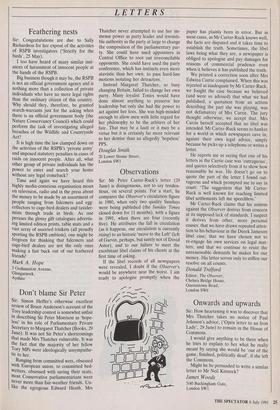Don't blame Sir Peter
Sir: Simon Heffer's otherwise excellent review of Bruce Anderson's account of the Tory leadership contest is somewhat unfair • in describing Sir Peter Morrison as 'hope- less' in his role of Parliamentary Private Secretary to Margaret Thatcher (Books, 29 June). It was not Sir Peter's shortcomings that made Mrs Thatcher vulnerable. It was the fact that the majority of her fellow Tory MPs were ideologically unsympathe- tic to her.
Ranging from committed wets, obsessed with European union, to committed bed- wetters, obsessed with saving their seats, most Conservative parliamentarians were never more than fair-weather friends, Un- like the egregious Edward Heath, Mrs Thatcher never attempted to use her im- mense power as party leader and irresisti- ble authority in the party at large to change the composition of the parliamentary par- ty. She could have used appointees in Central Office to root out irreconcilable opponents. She could have used the party conference, which has instincts even more atavistic than her own, to pass hard-line motions isolating her detractors.
Instead Margaret Thatcher, so busy changing Britain, failed to change her own party. Many loyalist Tories would have done almost anything to preserve her leadership but only she had the power to act against her foes. She was high-minded enough to allow men with little regard for her philosophy to be the arbiters of her fate. That may be a fault or it may be a virtue but it is certainly far more relevant to her demise than an allegedly 'hopeless' PPS.
Douglas Smith
20 Lower Sloane Street, London SW1


















































 Previous page
Previous page